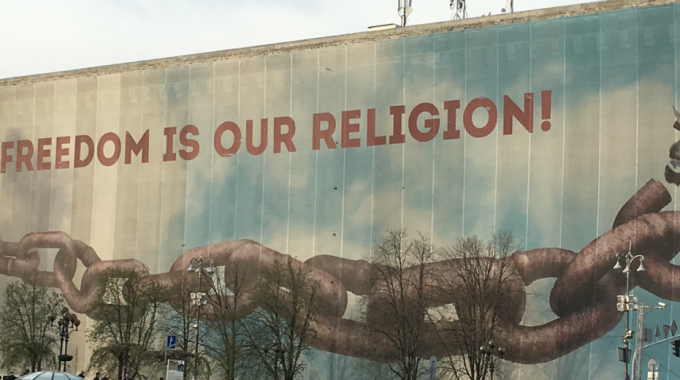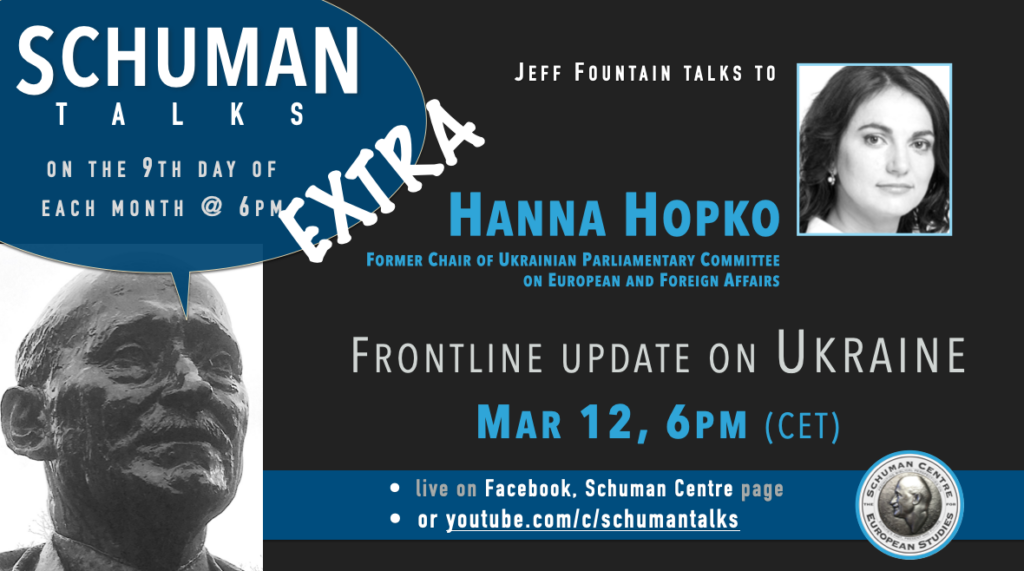
A Botched Invasion?
With Churchillian defiance and against all odds, Vladimir Zelensky and the Ukrainian people are defending their families, fatherland and freedom on land, sea and in the air. This is their darkest yet finest hour.
Despite the ruthless destruction of the children’s hospital in Mariopol and other tragic atrocities against civilian targets, the Ukrainians refuse to be cowed. (This in the spirit of this huge wall mural I photographed near Maidan Square – Independence Square – four years ago). Video reports show them fighting back with raw courage and moral outrage, stopping tanks and trucks with bare hands, daring to rebuke invading soldiers face to face or offering drivers of broken down tanks a tow back to Moscow.
Other reports tell of Russian paratroopers blown off course into an icy-cold watery grave; of amphibious attacks thwarted by stormy weather off the Odessa coast; of the state-of-the-art Russian warship ‘Vasily Bykov’ being sunk by old Grad rockets after being lured within range by a smaller Ukrainian naval boat; of columns of tanks hopelessly mired in mud by a flooded Dnieper river; and of the front-line deaths of several top Russian generals. Instead of fearsome irresistible force, the Russian army has so far projected weakness and vulnerability.
This was not the ‘shock-and-awe’ invasion the Kremlin expected would demoralise the Ukrainian army, depose the president and install a puppet government all within three days. Instead it has made Zelensky and his fellow Ukrainians world heroes. And you-know-who world villain number one.
Warning
Everyone loves to see the Davids slay the Goliaths of this world. Yet this is not a computer game or a spectator sport. Every life lost on both sides bore the image of God, however distorted. Russian government officials were warned last November by the programme director of the Russian International Affairs Council, Ivan Timofeev, that invading Ukraine would lead to a long drawn-out conflict ‘in which Russia would suffer more damage than it would inflict’.
But a furious and humiliated dictator in the Kremlin is not in the mood for compromise. Many expect the worst is yet to come.
Over the past Weekly Words I have sketched some historical and religious background to Putin’s violent ‘peace mission’, a story stretching back a thousand years. President Macron and other visiting heads of state have had to listen to hour upon hour of Putin’s version of that history, justifying his ‘divine commission’ to revive the Russian empire and unite Russian speakers everywhere despite existing national borders.
Yale professor Timothy Snyder offers many videos with truly insightful perspective on this story, arguing that European history is made in Ukraine. He joined global bestselling authors Yuval Noah Harari and Anne Appelbaum just a few days ago in an illuminating discussion about how this war changes everything.
One very compelling motivation for Putin’s high-risk adventure – which I have not come across anywhere else – is explained in a 30’ video entitled ‘What Russia wants in Ukraine’ (read: What Putin wants in Ukraine). Large offshore deposits of oil were discovered in the Black Sea near Crimea in 2012, just two years before Putin annexed the peninsula. Shale gas deposits were also discovered in Donbas and western Ukraine. Suddenly Ukraine was potentially the seventh largest oil supplier in the world – if it could procure the technology and finance to extract the oil. Shell and Exxon began then to explore how to turn Ukraine into Europe’s second largest petro-state. The Kremlin saw the huge threat looming of a Ukraine undermining Russia’s stranglehold on Europe’s energy supplies. The subsequent eight-year war in Donbas aimed to destabilised the nation and force Shell and Exxon to withdraw.
Dissent?
Over the past day or so remarkable signs of open dissent in Russia have begun to emerge. On state television (!), a well-known filmmaker described the war as ‘another Afghanistan, but even worse’. Before the moderator could redirect the discussion, his guest demanded ‘ending this operation’ to ‘stabilise things within the country’.
Russian history professor Andrej Zubov, about whom I wrote last week, somehow has just posted on Facebook (supposedly shut-down in Russia yet there for all to read) that ‘the educated class and the surrounding elite already recognize the failure of this war… Mr. Putin, having been defeated now in Ukraine, should certainly resign. Russia cannot manage a bankrupt politician. The voluntary resignation of the head of state is perhaps the last chance for Vladimir Putin to show personal courage. This resignation will open the way for our country to the difficult and long-term restoration of normal life, reconciliation with Ukraine and the whole world.’
Could the dam of Russian public opinion be about to break?
P.S. Last week I interviewed pastor, Yuriy Kulakevych, for a frontline update from Kyiv. This evening (Saturday March 12, 6pm CET) former Ukrainian MP and political activist Hanna Hopla will talk with me from Kyiv about latest developments. Join us!

Till next week,

This Post Has 0 Comments